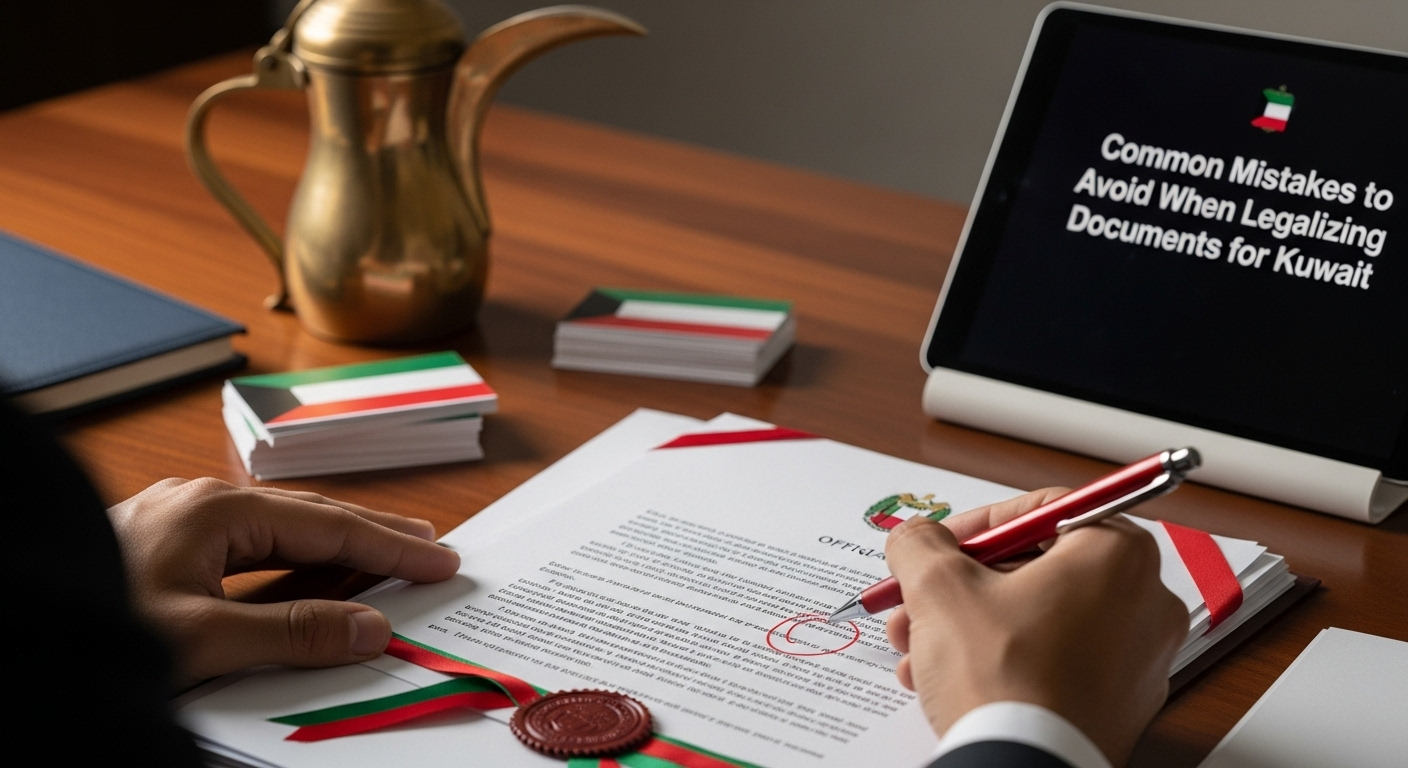
Common Mistakes to Avoid When Legalizing Documents for Kuwait
Legalizing documents for Kuwait involves several precise steps — from notarization to authentication and final embassy legalization. Missing even one requirement can cause delays or rejections. Whether you are preparing personal documents for visa purposes or business certificates for export, understanding the most common mistakes during the Kuwait document legalization process can help ensure smooth and timely approval.
1. Submitting an Apostille Instead of Embassy Legalization
One of the most frequent errors is sending documents with an apostille instead of full legalization.
Since Kuwait is not a member of the Hague Apostille Convention, an apostille is not valid there. U.S. documents intended for Kuwait must go through:
-
State authentication (Secretary of State)
-
U.S. Department of State authentication
-
Legalization by the Embassy of Kuwait in Washington, D.C.
Failing to follow this chain renders the document invalid in Kuwait.
2. Missing State-Level Authentication
Before a document can be authenticated at the federal level, it must first be certified by the Secretary of State in the state where it was issued. Many applicants skip this step or submit documents from multiple states without proper coordination, causing significant delays.
Tip:
Ensure each document is authenticated in the state of origin before sending it for federal or embassy processing.
3. Submitting Unnotarized Documents (When Required)
Certain documents — such as affidavits, power of attorney, or authorization letters — must be notarized by a U.S. notary public before they can be authenticated. Submitting an unsigned or unnotarized document will result in rejection at the first stage.
Always check whether your document type requires notarization before proceeding.
4. Using Expired or Unofficial Documents
Documents that are outdated, uncertified, or unofficial copies are not accepted for legalization. For example:
-
Birth or marriage certificates must be certified copies from a state vital records office.
-
Business documents must be issued by recognized authorities such as the U.S. Chamber of Commerce or the relevant state agency.
Photocopies or scanned printouts will not pass authentication.
5. Providing Incomplete Applicant Information
Missing key details — such as contact information, company name, or purpose of use in Kuwait — may cause verification delays. The U.S. Department of State and the Kuwait Embassy require clear identification of the document’s intended use (personal, commercial, or educational).
Double-check all application forms and supporting paperwork before submission.
6. Overlooking Translation Requirements
If your document is not in English or Arabic, it must be translated by a certified translator and notarized. In some cases, both the original and the translation must be legalized separately. Failing to do so may result in rejection in Kuwait.
7. Incorrect Payment or Missing Embassy Fees
Each stage of the process — especially at the Kuwait Embassy — requires specific fees. Submitting incorrect payment amounts or omitting payment details (like money orders or return labels) often leads to processing delays.
Always verify current embassy fees and acceptable payment methods before submission, as they are subject to change.
8. Ignoring Processing Times and Deadlines
Legalization involves multiple agencies, each with its own processing timeframe. Applicants who underestimate these timelines may face delays that affect travel, business contracts, or visa applications.
Recommendation: Start the legalization process at least three to four weeks in advance to account for any unexpected delays.
9. Not Using a Professional Service When Needed
For individuals or businesses unfamiliar with the process, handling legalization independently can lead to costly mistakes. Using a professional document authentication and legalization service helps ensure every step — from notarization to final embassy seal — meets Kuwait’s strict requirements.
10. Sending Documents to the Wrong Authority
Each document type must be submitted to the correct authority. For example:
-
Personal documents: Secretary of State → U.S. Department of State → Kuwait Embassy
-
Commercial documents: Local or U.S. Chamber of Commerce → U.S. Department of State → Kuwait Embassy
Sending documents to the wrong office or skipping the required intermediate step often leads to rejection and resubmission.
